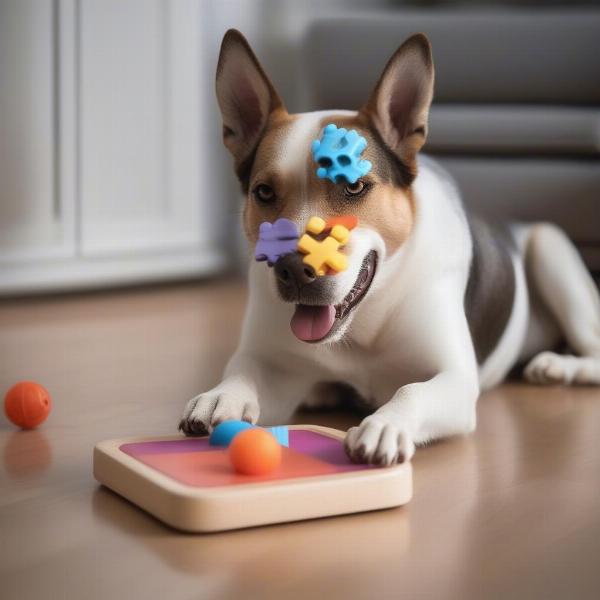The phrase “all dogs have ADHD book” suggests a popular belief that dogs exhibit ADHD-like behaviors. While no book definitively claims all dogs have ADHD, understanding canine behavior through this lens can be helpful. This article explores the similarities between certain dog behaviors and ADHD symptoms, providing insights into managing these behaviors effectively and fostering a stronger bond with your furry friend. We’ll delve into the science behind these comparisons, dispelling myths and offering practical advice for dog owners.
Understanding the ADHD Comparison in Dogs
It’s crucial to understand that dogs cannot be formally diagnosed with ADHD, a neurodevelopmental disorder affecting humans. However, certain canine behaviors mirror some ADHD symptoms, including impulsivity, difficulty focusing, and excessive energy. These behaviors can stem from various factors such as breed, age, training, environment, and underlying medical conditions. Observing these behaviors doesn’t necessarily indicate a problem, but rather an opportunity to understand your dog’s needs and tailor your training approach accordingly.
Common Dog Behaviors Resembling ADHD Symptoms
Several dog behaviors often get misinterpreted as ADHD-like tendencies. For instance, a dog constantly jumping on guests may be exhibiting impulsivity, while a dog struggling to learn basic commands may show difficulty focusing. A dog that relentlessly chases squirrels, seemingly oblivious to your calls, could be demonstrating hyperactivity and inattention. These behaviors, while potentially challenging, can be addressed with consistent training and appropriate management strategies.
Decoding Your Dog’s “ADHD”
Recognizing the root cause of these behaviors is paramount. A young, high-energy breed like a Border Collie may naturally exhibit higher levels of activity than a senior Pug. Likewise, a dog lacking sufficient physical and mental stimulation may develop destructive behaviors or become overly excitable. By identifying the underlying cause, you can implement appropriate solutions, whether it’s increasing exercise, providing engaging toys, or adjusting your training methods.
Training and Management Techniques for “ADHD” Dogs
 Dog engaged in interactive play
Dog engaged in interactive play
Just as with humans with ADHD, a structured routine and consistent training are key for dogs exhibiting similar behaviors. Short, frequent training sessions are often more effective than long, drawn-out ones. Positive reinforcement methods, focusing on rewarding desired behaviors rather than punishing unwanted ones, typically yield the best results. Providing ample opportunities for physical exercise and mental enrichment is also crucial. This can include walks, runs, playtime, puzzle toys, and training games.
Seeking Professional Help
If you’re struggling to manage your dog’s behavior, seeking professional guidance is always recommended. A certified dog trainer or a veterinary behaviorist can offer personalized advice and develop a tailored training plan. They can also help rule out any underlying medical conditions that may be contributing to the behaviors.
Conclusion
While the notion of “all dogs have ADHD” is an oversimplification, understanding the parallels between certain dog behaviors and ADHD symptoms can be a valuable tool for dog owners. By recognizing the underlying causes of these behaviors and implementing appropriate training and management strategies, you can foster a stronger bond with your dog and ensure a harmonious relationship.
FAQ
- Do dogs actually have ADHD? No, dogs cannot be diagnosed with ADHD, a human neurodevelopmental disorder. However, they can exhibit similar behaviors.
- What are some signs of “ADHD” in dogs? Impulsivity, difficulty focusing, hyperactivity, and excessive energy are common signs.
- How can I train a dog with “ADHD” tendencies? Consistent training, positive reinforcement, and ample exercise are essential.
- Should I see a vet if my dog shows these behaviors? Consulting a vet or a certified dog trainer is always recommended.
- What can I do to help my dog focus better? Create a structured routine, minimize distractions during training, and provide engaging activities.
- Is medication an option for dogs with “ADHD” like behaviors? In some cases, a vet may prescribe medication, but this is typically a last resort.
- Can diet affect my dog’s hyperactivity? A balanced diet is crucial for overall health and can influence behavior. Consult your vet for dietary recommendations.
About ILM Dog
ILM Dog is your trusted resource for all things dog-related. We offer expert advice on dog breeds, health, training, nutrition, grooming, and much more. Whether you’re a first-time dog owner or a seasoned expert, our comprehensive articles and resources provide valuable insights to help you navigate the joys and challenges of dog ownership. From choosing the right breed to understanding your dog’s behavior and ensuring their well-being, ILM Dog is here to guide you every step of the way. Contact us for personalized advice: [email protected] | +44 20-3965-8624.